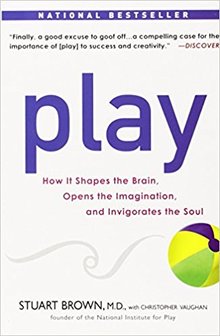|
Author Stuart Brown, in, Play: How It Shapes the Brain, Opens the Imagination, and Invigorates the Soul, noticed a striking theme in obituaries. What people remembered most about those who died were play moments. Head lines such as, "A Spitball-Shooting Executive," "A Frank Zappa Fan," and "The Lawn King: A practical Joker with a Heart," were littered over the paper. In each obituary descriptions were remembrances of play states which were like, "joyful threads running through their lives, weaving memories and binding them together emotionally."
Ironically, the very element of life celebrated and found most important in retrospect, is often believed to be frivolous. At some point in our journey to adulthood, we are made to feel guilty for playing. It's called unproductive, a waste of time, even selfish. Unless the play is teaching us a skill, making money, or a strategy to get close with someone who can advanced our position in life, play is considered irresponsible. What remains of acceptable play is often a very organized, competitive sport which lacks the spontaneity and joy that childhood play once brought. Skeptics may say, "Well, duh. Of course you will be happy if you play all the time. But for those of us who aren't rich or retired or both, there simply is no time for play." We fear play like a slippery slope that will lead us to out of control irresponsible behavior. The truth is, "the beneficial effects of getting just a little true play can spread through our life, actually making us more productive and happier in everything we do," says Brown. Work is not the opposite of play, it is rather a companion. When we are playful, we work harder, we play at our work, we are energized, more efficient, and get lost in our work. The opposite of play is boredom and depression. Play is essential throughout our lives, but especially in childhood. In his research, Brown discovered a missing element in the history of mass murderers in Texas. They were not allowed to play as children. Instead they were expected to do useful things like stay inside and practice the piano. When visitors came to the house, the children were put on display to show off whatever new trick he was taught by a parent. These murderers grew up in homes that were overly structured, rigid, and cold. Play was gone. Play and daydreaming are important in teaching boundaries, empathy, understanding, trust of others, and coping skills. They are even associated with higher academic performance and retention of knowledge. The social skills developed in play are so strong that play even diminishes the predilection of violence in children who have been abused. Play also helps society produce innovative ideas. "The toys of today are tomorrow's inventions." Play with numbers leads to mathematical reasoning; wind-up toys led to the first clock; even the first steam engine and plane were toys. A generation ago kids played around building their own computers. Today's kids are tinkering with robotics. So why do we over-schedule our children with classes, school, sports, and other extra-curricular activities? It turns out the road to a successful future is paved with hours and hours of unstructured play. And what about us adults? If we go without play for too long we eventually hit a wall and ask ourselves, "Is this all there is? Is this what the rest of my life is going to be like?" A sense of ennui takes over and a crisis hits. Brown says, "When we stop playing, we stop developing, and when that happens, the laws of entropy take over- things fall apart... When we stop playing, we start dying." For some this experience happens in adolescence, for others not until their sixties. However, for those who know how to bring play to their life's work, it never happens. If you are in need of a play boost, start with reflecting on your childhood play. What were your best play moments? What are the themes that run throughout your childhood as enjoyable, magical, experiences? We all have different play interests and personalities. Rather than start over with a search of new hobbies, start by getting back in touch with your childhood interests. When I took time to reflect, I was surprised to discover a theme of building and architecture design in my play history. I never thought of building as play. Although- not so surprising- as an adult, I spend quite a bit of my time planning possible home remodels, working on home improvement projects, and landscaping. My pinterest account is full of tiny-houses. I love going into my friend's homes and imagining new floor plans. I never noticed I did these things out of play and somewhere along the way these tasks lost some of their joy. By getting back in touch with my original intrigue with architecture, I've starting playing again at it. While my responsible-gotta-make-progress on home improvement mindset has slowed, my joy in it has come back. The tasks I do I enjoy and I'm finding more time for play with my kids. It is funny how when we revive play in our lives everything seems more balanced and easier. Take time this summer to revive play. It brings a sense of satisfaction and energy towards work that cannot be sustained without some fun. It also is what keeps relationships alive and enjoyable. It's what a good life is all about. So go out there and play! Catch you later, Stephanie Patterson, M.S., LMFT Downtown San Luis Obispo and downtown Atascadero, California www.SLOfamilyCounseling.com Comments are closed.
|

 RSS Feed
RSS Feed